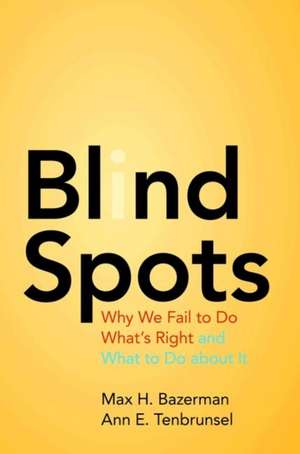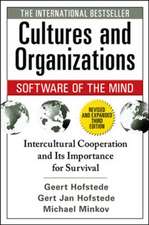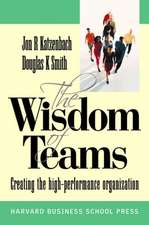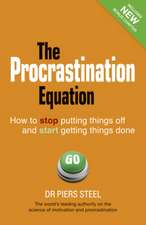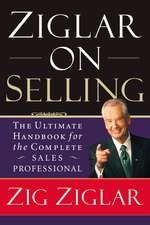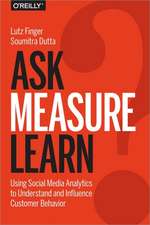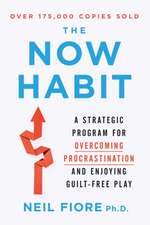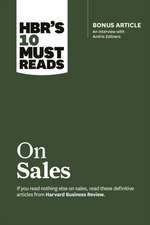Blind Spots – Why We Fail to Do What`s Right and What to Do about It
Autor Max H. Bazerman, Ann Tenbrunsel, Ann E. Tenbrunselen Limba Engleză Paperback – 3 ian 2013
"This fascinating book holds up a desperately needed mirror that objectively reveals a reflection we might not want to see. Yet through experienced guidance and genuine input, Bazerman and Tenbrunsel offer solutions that can powerfully change the way we do business."--Stephen R. Covey, author of The 7 Habits of Highly Effective People and The Leader in Me
"When we think of unethical behavior, the images that often come to mind are those of robbers, thieves, the executives at Enron, or Bernie Madoff. Blind Spots is not just about these criminals, but about a much larger problem-the dishonest actions that we all take while still thinking of ourselves as wonderfully moral people. In this important book, Bazerman and Tenbrunsel show us how we fail to see our own immoral actions in an objective light, and the trouble that this biased view gets us into."--Dan Ariely, author of Predictably Irrational
"Peppered with compelling examples, Bazerman and Tenbrunsel's lively book deserves the broadest possible audience. Showing that the human mind sometimes leads us to behave in ways that are inconsistent with our own ethical standards, Blind Spots introduces behavioral ethics and reveals how this emerging field has important implications for wise decision making in our personal and professional lives. This is a must-read for those responsible for shaping regulatory policies in organizations and government."--Robert H. Mnookin, Harvard University
"Bazerman and Tenbrunsel weave together solid scientific evidence, stories from the press, and reports from their own experiences to convincingly demonstrate that the actions of people and organizations often do not live up to their stated ethical standards. Addressing, in insightful ways, how this gap might be closed, this important book is a must-read for business leaders, government officials, and students of behavioral ethics."--Arthur P. Brief, University of Utah
"This terrific book summarizes the rapid advances made in the field of behavioral ethics and brings them to the attention of the thoughtful practitioner. With good examples and lucid writing, this book makes a reliable reference for people interested in building ethical organizations and institutions."--Madan Pillutla, London Business School
Preț: 95.68 lei
Nou
18.31€ • 19.90$ • 15.39£
Carte disponibilă
Livrare economică 31 martie-14 aprilie
Livrare express 14-20 martie pentru 41.71 lei
Specificații
ISBN-10: 0691156220
Pagini: 208
Ilustrații: 10 line illus.
Dimensiuni: 158 x 236 x 16 mm
Greutate: 0.34 kg
Editura: Princeton University Press
Locul publicării:Princeton, United States
Descriere
When confronted with an ethical dilemma, most of us like to think we would stand up for our principles. But we are not as ethical as we think we are. In "Blind Spots", leading business ethicists Max Baseman's and Ann Tenbrunsel examine the ways we overestimate our ability to do what is right and how we act unethically without meaning to.
From the collapse of Enron and corruption in the tobacco industry, to sales of the defective Ford Pinto, the downfall of Bernard Madoff, and the Challenger space shuttle disaster, the authors investigate the nature of ethical failures in the business world and beyond, and illustrate how we can become more ethical, bridging the gap between who we are and who we want to be. Explaining why traditional approaches to ethics don't work, the book considers how blind spots like ethical fading - the removal of ethics from the decision - making process - have led to tragedies and scandals such as the Challenger space shuttle disaster, steroid use in Major League Baseball, the crash in the financial markets, and the energy crisis. The authors demonstrate how ethical standards shift, how we neglect to notice and act on the unethical behavior of others, and how compliance initiatives can actually promote unethical behavior.
They argue that scandals will continue to emerge unless such approaches take into account the psychology of individuals faced with ethical dilemmas. Distinguishing our "should self" (the person who knows what is correct) from our "want self" (the person who ends up making decisions), the authors point out ethical sinkholes that create questionable actions. Suggesting innovative individual and group tactics for improving human judgment, "Blind Spots" shows us how to secure a place for ethics in our workplaces, institutions, and daily lives.
